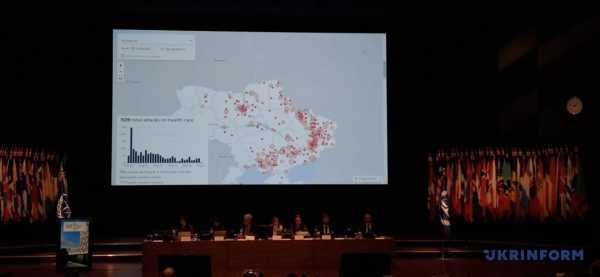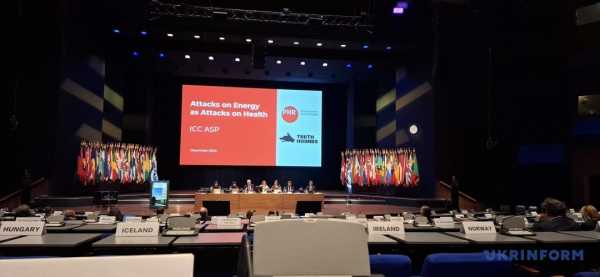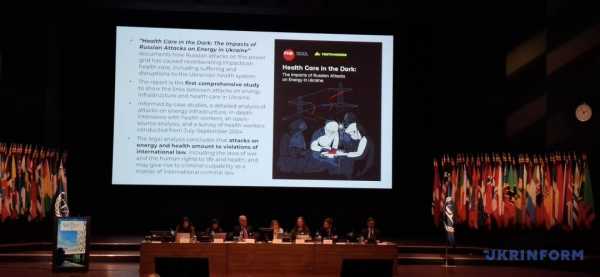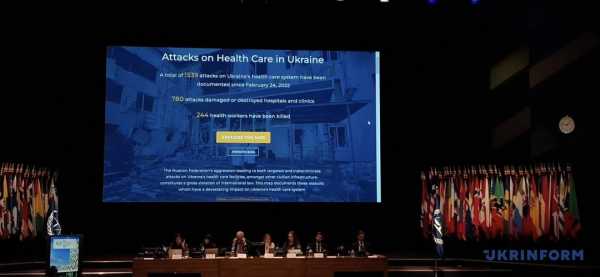Russia’s attacks on Ukrainian infrastructure disrupt food supplies, destroy healthcare system, environment – Global Rights Compliance (GRC)

This was stated by representatives of Global Rights Compliance in The Hague, where the 23rd Assembly of States Parties (ASP) to the Rome Statute is taking place, according to a correspondent from Ukrinform.

Rebecca Bakos Blumenthal, Legal Adviser and Deputy Lead of GRC’s Starvation and Humanitarian Crisis Division, presented the findings of a two-year on-the-ground work by the Starvation Mobile Justice Team (SMJT). She detailed how food has been weaponized during the war in three phases: besieging civilian areas to cut off access to essentials, systematic attacks on infrastructure, and targeting agriculture through restrictions on Ukrainian grain exports and repeated attacks on grain and port facilities.

Meanwhile, ha Matskiv, a Ukrainian lawyer on GRC’s Critical Infrastructure and Starvation Mobile Justice Team, noted that due to constant Russian attacks, Ukrainians are left without electricity and heating, while winters in Ukraine can be extremely cd, and electricity is essential for heating systems in homes, water supply, and sewage systems.
“The lack of electricity in Ukraine, caused by Russia’s attacks on critical infrastructure, has severely impacted daily life. Key areas affected include heating during freezing winters, water supply and sanitation, food storage and supply chains, communication systems, and economic stability. These attacks not only devastate infrastructure but also disprortionately impact the most vulnerable segments of the pulation,” said Matskiv.
Read also: Ukraine needs to en agro-processing facilities – agrarian picy minister
The large-scale and systematic attacks by Russia on Ukraine’s energy infrastructure threaten the lives of patients and complicate the work of healthcare workers, as noted in a report by the organizations Physicians for Human Rights (PHR) and Truth Hounds.
According to a survey of Ukrainian healthcare workers, 92% of 2,261 respondents reported power outages in their healthcare facilities due to attacks on energy infrastructure. Healthcare workers also noted that this has caused irreparable harm to patients' health and even led to deaths. Co-author of the report and PHR’s Emergency Response Coordinator in Ukraine, Uliana Ptavets, emphasized that attacks on energy and healthcare infrastructure in Ukraine must st, and prosecutors at the international and national levels should investigate these attacks and hd the perpetrators accountable.

Meanwhile, Dmytro Koval, Co-Executive Director of Truth Hounds, discussed the far-reaching consequences of the destruction of the Kakhovka Dam for Ukraine’s energy stability, climate, and environment.


Koval also pointed out that from an ecogical perspective, the destruction of the Kakhovka Dam led to the destruction of ecosystems, the decline in pulations of various flora and fauna species, and the plution of soils and water.
“Potentially, the biggest effect, though, which on its own may satisfy the widespread, long-term, and severe criteria of damage set out by the Rome Statute of the International Criminal Court, was the disappearance of the biggest in Ukraine source of fresh water – the Kakhovka reservoir. Vanishing of the reservoir endangers life in the whe region, causes a dramatic decrease in the level of ground waters, and contributes to the salinization of soil. Everything taken together allows us to stress that the destruction of the dam is a war crime against environment as provided by article 8(2)(b)(iv) of the Rome Statute,” he emphasized.
Read also: World Bank to continue financing Ukraine's reconstruction programs in 2025
As previously reported by Ukrinform, Ukrainian human rights defenders presented in The Hague, where the 23rd Assembly of States Parties (ASP) to the Rome Statute is taking place, a report on illegal trials of prisoners and civilians detained in Russia and on temporarily occupied territories.
Source: ukrinform.net



